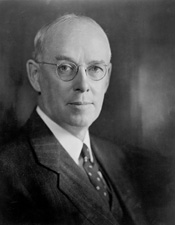Charles Tobey
| Charles William Tobey | |
|---|---|
 |
|
| 62nd Governor of New Hampshire | |
|
In office January 3, 1929 – January 1, 1931 |
|
| Preceded by | Huntley N. Spaulding |
| Succeeded by | John G. Winant |
|
United States Senator from New Hampshire |
|
|
In office January 3, 1939 – July 24, 1953 |
|
| Preceded by | Fred H. Brown |
| Succeeded by | Robert W. Upton |
| Member of the United States House of Representatives from New Hampshire's 2nd district |
|
|
In office March 4, 1933 – January 3, 1939 |
|
| Preceded by | Edward H. Wason |
| Succeeded by | Foster W. Stearns |
| Member of the New Hampshire House of Representatives | |
| Personal details | |
| Born |
July 22, 1880 Roxbury, Massachusetts |
| Died | July 24, 1953 (aged 73) Bethesda, Maryland |
| Political party | Republican |
| Spouse(s) | Francelia Lovett (desc.) Loretta Capell Rabenhorst (desc.) Lillian Crompton |
Charles William Tobey (July 22, 1880 – July 24, 1953) was an American politician, who was a Governor of New Hampshire and a United States senator.
He was born in Roxbury, Massachusetts, the son of William Tobey, an accountant, and Ellen Hall Parker Tobey. His father had moved to Massachusetts from Maine in the 1860s. Charles Tobey had relatively little formal education. He attended the Roxbury Latin School for four years (being part of the Class of 1897), but was forced to withdraw before graduation because of family financial difficulties. He had a thorough knowledge of the Bible, however, which he gained from his mother, an ardent Baptist. As a result, Tobey's speeches were always marked by a generous sprinkling of biblical quotations and classical allusions.
On June 4, 1902, Tobey married Francelia Lovett. A year later they began to spend summers in Temple, New Hampshire, on an old farm that they had purchased. For several years Tobey commuted during the summers to Boston, where he worked as a clerk for various insurance and banking firms. In 1911, however, he decided to move to Temple and become a full-time farmer. He was a good poultryman and considered himself a farmer for the remainder of his life, although in 1916 he moved to Manchester, New Hampshire, to resume a career as a bond salesman. His four children were born in Temple, which Tobey always maintained as his legal residence.
Tobey served on the Temple school board and the board of selectmen. In 1914 he was elected to the state legislature as a candidate of the Progressive Party. He was a friend and disciple of the progressive Republican Robert P. Bass, a former governor. New Hampshire progressivism was characterized by an effort to democratize the processes and make equitable the administration of government and to challenge powerful economic interests such as the Boston and Maine Railroad. Tobey's hard-working manner, wit, and commonsense intelligence led to his political success. He served three non-consecutive terms in the New Hampshire House of Representatives and was speaker in 1919-1920, winning an important victory over the old-guard candidate. Tobey had returned to the Republican Party after the 1914 election.
...
Wikipedia
